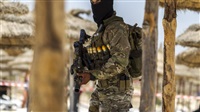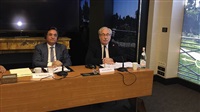Belgium: the core of international terrorism

Despite the strong existence of Islamic
groups and streams in many European countries; Belgium is the most country on
the old continent suffer from the spread of these groups (especially hardliners)
on its territory.
What has helped in this is the existence
of secular atmosphere as a guarantee for such streams to remain and spread
widespread there.
Belgium (which hosts the largest Muslim
community in Europe compared to its 1.5 million populations) is facing serious
risks as extremist groups adopt the ideology of violence to "Islamize
Belgian society" and establish an Islamic state.
The scientist, Felice Dassetto predicted
in a study that Muslims would represent the majority of Brussels' population by
2030.
In a letter sent by Radwan Ahroush, a
leader of the Islam Party, in which he called on Belgian society to abandon
Christianity and embrace Islam, he raised a warning: "Be a Muslim and you
are in safe". This message reflects the extremist tendencies of these
groups.
At the same time, it reveals its
orientations in an intellectual diversity that is predominantly hostile in
various names.
Perhaps the terrorist strikes received
by Belgium indicate the extent of the radical incursion into the
Takfiri-Jihadist ideology. Which has spread within Belgian society, under the
tolerance of the Belgian Government.
There are many Muslim brotherhood arms
in Belgium, such as the "charity organisation", which is one of the
extremism windows. it is known that the presence of the Muslim brotherhood on
the Belgian territory began after the migration of many immigrants from the
Middle East and North Africa.
The Brotherhood's arms were founded in
Belgium by Syria's Mohammed Hawari at the University of Brussels in the 1970s.
With the continuation of Qatari support for this group, many associations and
organizations were established and they set control of some mosques there. It
has evolved to include the establishment of a lobby there influential in the
course of religious trends.
In addition, the Brotherhood has been
able to form partnerships with many non-Muslim entities, such as the Christian
Democratic Party and the Socialist Party in Brussels. The Muslim Brotherhood in
Belgium controls many organizations, the most important of which are the
Association of Belgian Muslims, the Union of Islamic Organizations in Europe,
the Muslim Youth Forum, The Muslim belief in charitable works, in addition to
many mosques, including Dar Al-Quran, Islamic Gathering Society and the
European Islamic Network.
The brotherhood exploits these advocacy
and charity platforms as important means of influencing and penetrating Belgian
society. Especially since many of these organizations are close to the European
organizations that are deployed there.
Narrowing the medium
In view of the dangers faced by Belgium,
due to the presence of militant groups strongly on its territory; Belgian
authorities decided to tighten the medium on all Islamic movements.
Especially the Muslim Brotherhood, by
limiting residence, limiting the reason for the presence on its territory, and
expelling all those involved in any terrorist acts - especially belonging to
the Muslim Brotherhood.
Belgium accused the State of Qatar of
being the main sponsor of the Muslim Brotherhood. In late 2017, it decided to
ban 12 Turkish imams from entering its territory because of Turkey's
cooperation with the Muslim Brotherhood, and they were members of the Muslim
Brotherhood in Turkey and regarded them as a threat to their country.
This was not the first procedure of its
kind taken by the Belgian authorities against members of the Muslim
Brotherhood. In 2014, the Belgian Minister of Interior, Jean Chaldeon, decided
to prevent Tariq Sweidan from entering Belgium to attend the Islamic Exhibition
in Brussels, because of his defending of the Muslim Brotherhood.
The Islam Party, is considered as one of
the first Shiite parties founded in Belgium. It is founded by Radwan Ahroush,
and the first to establish a Shiite mosque there, in 1999. The basic goal of
this party focuses on the Islamization of Belgian society, and the
establishment of an Islamic state.
The Islam Party was active in Belgium under
the name of the Noor Islamic Party. On July 28, 2001, Radwan Ahroush announced
that "Muslims can not join non-Islamic parties. So we established the Noor
party to represent Muslims and defend Islamic values. "
The
party follows the Hawza system in Iran, and Ahruosh seeks to participate in the
Belgian parliamentary life. He obtained 5% of the parliamentary vote before
increasing in 2014, to 10%.The party won two seats in municipal elections in
October 2012.
Lutsen Ait Gedig, Radwan Ahruosh
Mulnebeck St. Jean and Anderlecht also won local elections there, especially as
the number of Muslim expatriates or converts to Islam rose.
The Islam Party is planning to push
candidates in the European elections in the coming years. In this regard, the
founder of the party, Radwan Ahroush, says: "We are seeking in stages to
be the largest party in Brussels.
Muslim Youth Party
The "Muslim Youth" party was
established in Belgium in 2004 by Abdullah Abuaziz Bustan. Its objectives are
four axes related to education, work, housing and Islamic customs. As well as
the call to wear the hijab and distancing away from the Christian tradition.
The party dates back to the Islamic Youth Movement, which was founded in 2002.
Basam al-Ayashi, the Syrian immigrant,
founded radical roots in Brussels, which has become known as the Belgian
Islamic Center, and has been linked to some of the terrorist al-Qaeda figures
and many of the terrorist operations associated with his name.
On May 12, 2017, the Belgian authorities
arrested the director of the center in Brussels, Gamal Ben Saleh Muamna, who
was under investigation by the commission appointed by the Belgian Parliament
to investigate the terrorist events in Brussels in March 2016.
The hardline Salafi movement is based in
the town of Mullenbeck, which is located near the Belgian capital of Brussels.
This trend has resulted in many similar trends, such as the organization of the
"Sharia Movement for Belgium" founded by Moroccan Fouad Belkacem,
March 3, 2010, in response to these facts, influenced by existing Salafist
European groups, such as: "Islam for Britain", led by Islamic
militant "Anjam Chaudhry"; to spread the Islamic ideology.
The meeting of «Belkacem», «Anjam
Chaudhry» in 2010, is the first turning point towards radicalism, and imitates
the speech of the movement of Sharia for Belgium, the speech put by «Chaudhry»
and other leaders of Islam for Britain; in Belgium.
Belkacem declared his opposition to democracy
and incitement to sectarian violence. In April 2010, the organization forcibly
entered one of the classrooms at the University of Antwerp; where the Dutch
writer «Pino Bernard» delivered a lecture, and began members of the
organization to say Islamic slogans, and the lecture was ended by the
intervention of police forces and arrest.
Departure to Syria
In early February 2012, Fouad Belkacem
was convicted for the nineteenth time, sentenced to two years' imprisonment and
fined 550 euros; instead of arresting 15 of his symbols. The members of the
Movement for the Law of Belgium announced at the time that they were continuing
their work, and later found out that many of them had gone to Syria to fight in
the ranks of an oppressive organization.
This was parallel with the emergence of the Tabligh and Da'wa group,
which helped to create the new Salafi trend, most of whom belong to immigrants
who came to Belgium.
Belgium
is considered the largest source of militant groups in the Middle East. It
represented the largest center for the preparation of fighters and terrorist
operations, as well as the number one exporter of Western fighters with a total
of 380 fighters. The first Western suicide bomber to carry out a suicide attack
in Iraq was Belgian nationality, in 2005.
Belgium is unable to control the danger
associated with the expansion of extremist ideas, especially in light of the
increasing numbers of Muslims there. In addition to the many challenges it
faces and the slow steps it is taking to confront this challenge. The danger of
creating a parallel society within Belgian society is the most disturbing of
the authorities, as well as the creation of a rigid society in understanding
religion and not recognizing Belgian law and sectarian isolationism is a threat
to the democratic and constitutional system.
In this context, the Belgian government is reviewing the agreement on the Great Mosque in Brussels in a move to dismantle these ties. It seeks to regain control of the Executive Directorate of the Muslims of Belgium after it handed over to many Arab and Islamic countries, which it concluded in 1968 with the Islamic Center Which was established in 1936, and the subsequent ratification of the Belgian state in 1975 to introduce Islamic lessons within the school programs.









